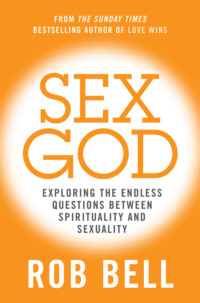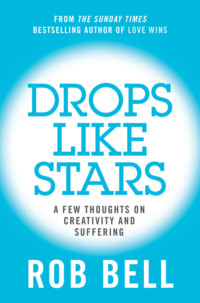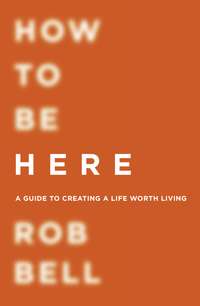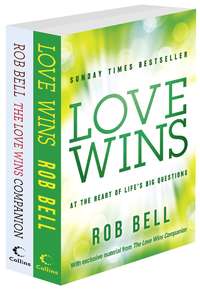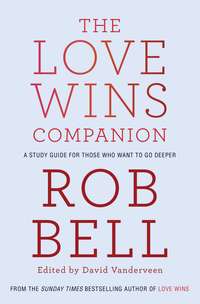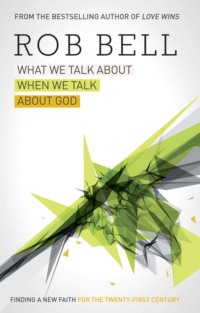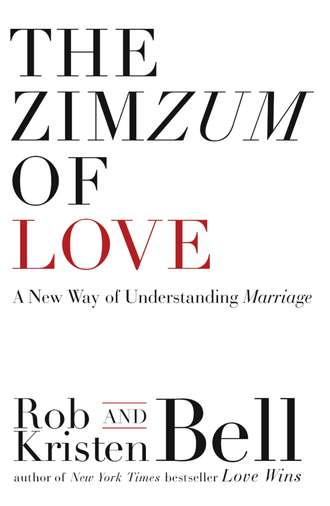
Полная версия
The ZimZum of Love: A New Way of Understanding Marriage



Copyright
William Collins
An imprint of HarperCollinsPublishers
1 London Bridge Street
London
SE1 9GF
WilliamCollinsBooks.com
First published in Great Britain in 2014 by William Collins
This paperback edition published in Great Britain in 2016 by William Collins
Copyright © WORB, Inc., 2014
Designed by Terry McGrath
Illustrations by John Stevens Photograph here by Carolyn Baas
Rob and Kristen Bell assert the moral right to be identified as the authors of this work
A catalogue record for this book is available from the British Library
All rights reserved under International and Pan-American Copyright Conventions. By payment of the required fees, you have been granted the non-exclusive, non-transferable right to access and read the text of this e-book on-screen. No part of this text may be reproduced, transmitted, down-loaded, decompiled, reverse engineered, or stored in or introduced into any information storage and retrieval system, in any form or by any means, whether electronic or mechanical, now known or hereinafter invented, without the express written permission of HarperCollins
Source ISBN: 9780007582082
Ebook Edition © November 2014 ISBN: 9780007557936
Version: 2016-01-13
CONTENTS
COVER
TITLE PAGE
COPYRIGHT
PREFACE
CHAPTER 1: WHAT’S A ZIMZUM?
CHAPTER 2: RESPONSIVE
CHAPTER 3: DYNAMIC
CHAPTER 4: EXCLUSIVE
CHAPTER 5: SACRED
EPILOGUE
QUESTIONS
ENDNOTES, COMMENTARY, AND A WORD FROM BOB DYLAN
THANKS
ABOUT THE PUBLISHER
PREFACE
A while ago we came across an idea about the origins of the universe that made us think of marriage. We weren’t aware that anyone had connected this idea with being married, and it got us thinking. The more we talked about it, the more this idea evolved into a new way of understanding marriage. We found ourselves thinking we should write a book about this.
So for a year and a half now, we wake up in the morning and make breakfast for our kids and take them to school, and then we sit side by side at a desk, doing our best to give language to this new way of understanding marriage.
There are, of course, lots of books on marriage. Practical books, inspiring books, books that can give you all sorts of advice and steps and techniques for facing and dealing with the challenges of marriage, from communicating better to handling money to sex to the division of household tasks.
This book, however, is about the deeper mysteries of marriage. How is it that the same relationship can be capable of producing so much joy and so much pain? How is it that the slightest thoughts and actions can so significantly change the space between two people? How is it that the space between two people can be so unique that it exists nowhere else in the universe? How is it that flawed, fragile, flesh-and-blood human beings can relate to each other in such a way that they show each other the divine?
Something powerful and profound happens in marriage—something involving energy, love, and the deepest forces of the universe. We believe that you can grow in your awareness of these realities, learning how to better see what’s going on in the space between you, how it works, and how the love can flow all the more freely between you.
To that end, we’ve included discussion questions at the end of this book as well as endnotes with commentary to help you explore these deeper mysteries together.
It’s our hope that this new way helps you better understand and enjoy this mysterious, extraordinary, difficult, beautiful, frustrating, complicated gift called marriage.
CHAPTER 1
WHAT’S A ZIMZUM?
We want to give you a new way of understanding marriage.
It’s called the zimzum of love, and we explain it with stick figure drawings.
At first, it’s just you.

Your life is mostly about you. Your friends and your work and your schedule and your interests and your goals and your thoughts and all the rest of what makes your life your life.
Your center of gravity extends roughly as far as you.

But then you meet someone—or you’ve known someone for a while—and that person has their own life, with their own center of gravity, and your heart begins to shift toward them.

You find yourself thinking about them, drawn to them. When you’re not with them, you miss them, you ache for them, your phone rings and when you see that it’s them you feel a surge of electricity through your body.
You talk for hours. You start arranging your life so that you can spend as much time as possible with them as your lives become increasingly intertwined.
As you become familiar with what moves and drives and inspires them, their well-being begins to matter to you more than your own. You find yourself making sacrifices for them,

while they’re doing the same for you.

It’s here that you become aware of a subterranean shift, a tectonic slide in your heart, one that alters the course of your life:
Your center of gravity expands.

You are in new territory.
Before, it was just you.
Now, it’s you—and this other person.
Before, there was one.
Now, there are two.
As you intentionally create space for this person in your life and they create space in their life for you, this movement creates space between you—space that has an energetic flow to it.

This flow in the space between you is like an energy field or an electrical current. It’s the draw, the pull, the magnetic attraction that leads you to give yourself to this person in a way you don’t give yourself to anyone else on the planet.
It’s a vibrant, pulsing, humming flow that stirs your heart and causes your soul to soar. You talk about falling in love because of the feeling of weightlessness it evokes; you speak of finding your other half because of those moments when your boundaries feel porous, like you don’t know where you end and they begin. You speak of being swept away, like you’re caught up in something bigger than the both of you, like you’re flying, the intoxicating attraction you feel toward another human being taking you both somewhere new and thrilling.
And then there’s us, standing in our kitchen arguing about something one of us said about the microwave.
K: It was me. I made a comment—
R: —that made no sense.
K: And then he wouldn’t drop it.
R: I couldn’t figure out what she was talking about.
K: And so he got butt-headed about it.
R: Just explain what you meant.
K: Just drop it. Let it go. Relax.
R: So you’re saying you didn’t mean it?
K: I’m saying it’s not worth discussing.
R: Then why did you say it?
We’re going round and round having the dumbest discussion in which neither of us is actually listening to the other and it’s getting more and more ridiculous because we’re making less and less sense—and then our older son, who’s been sitting there the entire time witnessing this train wreck of a conversation, finally says,
K: With his head in his hands,
Will you two stop it? You’re driving me crazy!
(We’re laughing as we write this.)
There are moments in marriage when you realize that you’re brushing up against our deepest experiences of what it means to be human, when you become aware that some of the most profound truths of the universe are lying next to you in bed, moments that illuminate our most innate and mysterious longings for grace and connection and vitality.
And then there are other moments, when lofty talk about two becoming one and I found my other half seems delusional, when you wonder, Who is this crazy person and why in the world did I ever want to be married to them?
Marriage.
You find someone—or they find you (that’s part of the mystery, isn’t it?)—and out of seven billion people on the planet, you decide to say yes to just one of them, till death do you part.
There is something about marriage—something about the potential, the promise, and the possibilities of creating a life together—something so powerful and compelling and alluring that despite all the pain marriage has caused over the years, people are still looking for that one person—and still getting married.
Still standing on beaches staring into each other’s eyes for engagement photos, still registering for matching bath towels, still trying to figure out whether or not the groomsmen should wear the cummerbunds, because, after all, they’re included in the rental.
K: The dating site match.com gets around seventeen million unique visitors a month. Seventeen million people a month holding out hope that that person is out there.
There’s all sorts of speculation about exactly how many marriages don’t last—the general consensus being quite a few—but statistics are beside the point because we’ve all seen marriages unravel around us—neighbors, co-workers, parents of our kids’ friends—people taking off wedding rings, selling houses, working out joint custody arrangements.
Divorce is like a death, only the other person is still alive.
Some say that the enduring draw of marriage is rooted in cultural conditioning. And they have a point. Our daughter was watching a movie recently about a princess who was waiting for her prince to rescue her so that they could live happily ever.
And she’s four (our daughter, not the princess).
Others say that our ongoing propensity to keep getting hitched is simply biology in its more advanced and organized forms, that we’re hardwired to find someone to make more someones with and so marriage is simply a social construct we’ve created to propagate our species.
R: Two words about that: throw pillows.
K: Throw pillows?
R: Dudes learning to properly arrange throw pillows on the couch because that’s how she likes it.
K: What do you mean by that?
R: There’s a direct connection between primal mating impulses rooted in biological survival instincts and the intentional organizing of decorative cushions.
K: In other words, our species has an astonishing ability to adapt.
And then there’s the Jagger Theory (as in, Mick), which states in a very straightforward manner that monogamy isn’t our natural inclination so why do we keep torturing ourselves with this outdated and antiquated custom that shackles two people to the constricting notion that they must remain exclusively and faithfully committed to each other with no other experiences of a similar sort until one of them is left standing over the grave of the other?
That question leads to another question, one many people have about marriage: Has any institution/idea/arrangement caused so many people so much agony? Is there a greater ache than giving your heart—not to mention your life—to someone, only to have it collapse and fall apart on you?
Some say the expectations are the problem. If people just lived together in peace and harmony without all the legal obligations and wedding rings and assumptions that come from having a public ceremony in front of your friends and family with cake and an eighties cover band, then there would be a lot less heartache if things don’t work out. But sharing your life with someone—whatever that looks like—always involves challenges, and if you part ways, that kind of pain is always heartbreaking.
But whether there’s a ceremony or a ring or a legal document or not, whether it’s biology or cultural conditioning or simply pressure from the relatives, there is an enduring human longing to share our life with someone.

For us, it started in a pickup truck.
It was an early eighties Mazda pickup with a cab on the back and black stripes down the side.
R: I bought it from my neighbor, Dr. Dull.
K: It had a cassette player bolted under the dashboard with the smallest speakers you’ve ever seen.
R: That’s what you remember about that truck—its tiny speakers?
K: What I remember most are the butterflies I had in my stomach the first time I got into that truck. I was living in Arizona at the time and Rob was living in Los Angeles, and when I was accepted into a master’s program at USC, I called him and asked if he would help me find a place to live.
R: Which sounded a little suspicious to me because it was January and her program didn’t start until June.
K: I could say I was just planning ahead—but the truth is, I wanted to know whether this was something more than a friendship.
R: So as I pulled up to “Arrivals” at the airport, I had the strong sense that there was something else going on here. I thought it was better just to get it out in the open, and so when she got in the truck I asked her, “What percentage of your visit is actually to look for a place to live?” She smiled and said, “Well, it makes a great excuse.” I will never forget the BOOM!!! that went off in my heart when she said that.
K: Maybe we should back up for a moment. I grew up in Arizona, Rob grew up in Michigan, and we met on a tennis court our freshman year at Wheaton College.
R: To be honest, I knew who she was before we met on that tennis court. During freshmen orientation they gave us a book called Who’s New, which was filled with pictures of incoming freshmen. My friends and I spent hours poring over that book. One of those first days of college, sitting in my room in Traber dorm, I came across Kristen’s picture. Wow, I thought. I should meet her, so that we could, um, study together.
K: I don’t remember Rob studying much, but I do remember once during that freshman year having a conversation with him about cactus. He was fascinated with cactus and couldn’t imagine that I came from a place where we had a large cactus in our yard.
R: Fascinated with cactus? (Cacti?) Really? That may be the lamest excuse I’ve ever heard for chatting up a girl. I suddenly developed an interest in cactus? Did I know how pathetic that must have sounded at the time?
K: Apparently it worked because that summer I sent him a letter (remember those?) with a photo of me standing next to a very large cactus.
R: I remember that photo. And I remember those letters. Our friendship was like that for four years—inside jokes, letters back and forth, having a meal together every now and then, going out as a group with my friends and her friends.
K: I’d go watch Rob’s band perform. He had written one song in particular that moved me. The fact that he’d written those lyrics made me wonder what else was in there.
All of which brings us to graduation.
K: I was headed home to work in Arizona.
R: And I was moving to California, which meant driving through Arizona. In one of the first conversations Kristen and I ever had, we talked about waterskiing, and she said that her family had a MasterCraft, which to me was about the greatest boat a person could own, so I said, “Well, I ought to stop by sometime and we could go waterskiing.”
K: Which I thought would never actually happen. But then at graduation he reminded me of that conversation four years earlier, and he said, “Can I stop by at the end of the summer so we can go waterskiing?” A few months later he showed up at my parents’ house and stayed for several days. When he left, I hoped I would see him again. But I had no idea how that would work.
R: And so I continued on to L.A.
K: And I continued on with my life.
R: And I moved in with my eighty-two-year-old grandmother to take care of her while I went to seminary.
K: And then I got the early acceptance letter from USC, and I called him to tell him I’d be moving to L.A.—and the next thing I knew I was getting in that truck and saying, “It makes a great excuse.”
R: Which was a great line, by the way. Classic.
K: Thank you. But I think there’s an important point to make to here. I knew what I was getting into, and I’m not just talking about the truck. I already knew his friends, his family; I’d seen him in all kinds of different situations—there weren’t any surprises. I was ready to see whether this was headed somewhere.
R: Which it was. Specifically, to my grandma’s apartment. How killer is that? Me and this hot woman from the desert and my grandma, chillin’ on the green polyester couch with the paisley stitching.
You can be friends with someone, sometimes even for years, with a tremendous amount of respect and friendship and history between you, but when that spark ignites, everything changes.
Several months later we were living in the same city, shortly after that we were engaged, nine months later we were married, and twenty years later we’re still exploring the endless depths of whatever it is that began when Kristen got in that truck and we drove off together.

You find each other, your centers of gravity expand as your lives become more and more entwined. You create space for this other person to thrive

while they’re doing the same for you.

This creates a flow of energy in the space between you.

This energy field is at the heart of marriage. It flows in the space between you, space that exists nowhere else in the universe.
You can become more familiar with how this energy field works.
You can develop language between you to identify what’s happening in the space between you.
You can sharpen your abilities to assess it.
You can act in certain ways to increase the flow.
You can identify what’s blocking the flow, and then you can overcome those barriers.
Years into your marriage, you can continue to intensify this energetic flow between you.
It is risky to give yourself to another. There are no guarantees, and there are lots of ways for it to fall apart and break your heart. But the upside is infinite.
There is a mysterious, indescribable, complex exchange that can happen in the space between you, filling you with joy, confirming your intuition that marriage is not only good for you, but good for the world. Marriage has the uniquely powerful capacity to transform you both into more loving and generous and courageous and compassionate people. Marriage—gay and straight—is a gift to the world because the world needs more—not less—love, fidelity, commitment, devotion, and sacrifice.
We’re for marriage, and we want to give you a new way of understanding marriage.
We call this way the zimzum of love.
Which of course raises the question:
What’s a zimzum?

K: Rob loves words. I realize that may sound strange, but he loves finding new words and odd phrases and then using them around the house, repeating them and thinking they’re hilarious. And the more random the better, like catty wompus or rusty Kleenex.
R: Or Engelbert Humperdinck—
K: —as I was saying …
R: Or unpidgeonholeable—
K: Yes?
R: —or fog index or history of fishes …
K: In the last page of endnotes in his book What We Talk About When We Talk About God Rob gives a list of words and phrases and names for apparently no reason other than sheer enjoyment.
R: Like the word cummerbund.
K: Cummerbund?
R: The thing some men for unknown reasons choose to wear around their midsections at weddings. It’s a Persian word, from the word kamar, which means waist—it’s actually a kamar band.
K: I rest my case. Which is why it didn’t surprise me when he started using the word zimzum.
R: Zimzum (originally tzimtzum) is a Hebrew word used in the rabbinic tradition to talk about the creation of the world—not in a scientific way but more like something somewhere between poetry and metaphysical speculation. Followers of this tradition began with the assumption that before there was anything, there was only God. The divine, they believed, was all that was. For something to exist other than God, then, God had to create space that wasn’t God. A bit esoteric, but stay with me. Their contention was that for something to exist that wasn’t God, God had to contract or withdraw from a certain space so that something else, something other than God, could exist and thrive in that space. And the word they used for this divine contraction is zimzum. God zimzums, so that everything we know to be everything can exist and thrive.




